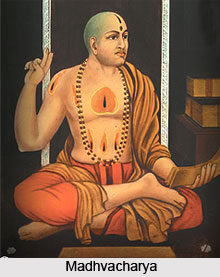 Concept of Visesa is one of important concepts in philosophy of Madhvacharya. This concept solves the dualism of a substance. In all systems of thought there is a problem of relation between substance and attributes is one of the most tempting questions. One`s mind needs to make this distinction. For example a particular thing`s colour, the decoration, its shape, hardness are at the same time observed. The point of common reference is distinguished from the attribute as the substance and this is called the `thing-in-itself.
Concept of Visesa is one of important concepts in philosophy of Madhvacharya. This concept solves the dualism of a substance. In all systems of thought there is a problem of relation between substance and attributes is one of the most tempting questions. One`s mind needs to make this distinction. For example a particular thing`s colour, the decoration, its shape, hardness are at the same time observed. The point of common reference is distinguished from the attribute as the substance and this is called the `thing-in-itself.
Some attributes can be removed from the object without any harm to it. Easily separable attributes are joined externally with an object and their relation with the latter is called Samyoga. The inherently joined attributes which can be distinguished form a whole with the object and cannot be separated from. An inherent relation is called Samavaya by the Nyayayika (logical) realists. Making the Samavaya relation credible is difficult. Samavaya is in itself regarded as a category by the Nyayayika realists. There are several other alternatives as regards to the relation between substance and attribute. If they are separate entities, Samavaya relation of the Nyayayikas become external to the two terms and thereby ceases to be Samavaya. The relation that is posited between the two terms has an inherent capacity to unite itself with them both.
Self-linking capacity of substances with their attribute is called Visesa by Madhva. The self-linking capacity eliminates a third entity called `Inherent Relation` between the substance and attribute. The doctrine of Visesa thus solves the dualism of substance and attribute by reducing it into identity-in-difference. The attribute thereby becomes one in entity with the substance, but is yet distinguishable in an indivisible manner from it. The attributes do not exist apart from the substance. Though they constitute one entity, yet they are only one as two by virtue of distinguishability by Visesa.
Some make the mistake of identifying the Visesa of Madhva`s philosophy with the Visesa of the Nayyayikas. The Visesa of the Nayyayikas is an attribute which is separate from the substance but linked with that substance by the Samavaya relation. Madhva`s Visesa is a self-linking potency that is inherent in the substance to link itself with any number of attributes without the help of Samavaya relation. The substance and attributes is a whole. Visesa distinguishes as well as unites too. However Visesa should not be invoked where there is separable difference between entities. In Madhva` philosophy difference is a distinct and an important category. The concept of Visesa is not meant to supersede difference. Visesa and Bheda are supreme each in their own field.




















